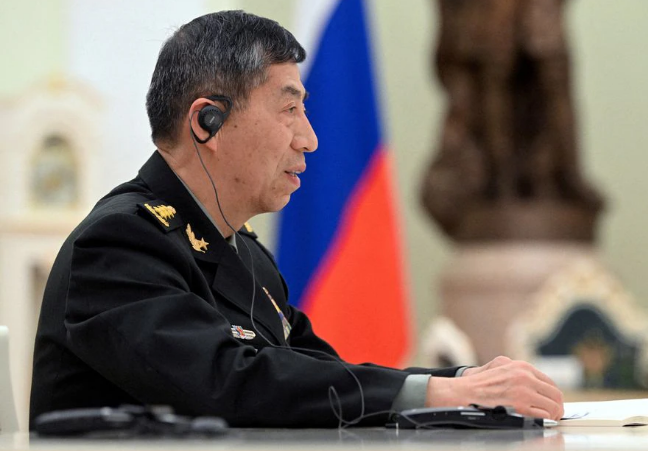The absence of Chinese Defence Minister Li Shangfu from the public eye has raised questions about his role and relations, both within China’s leadership and on the global stage. Li’s position on the Central Military Commission, China’s top defence body commanded by President Xi Jinping, has come under scrutiny. Additionally, his interactions with the United States, including past sanctions, have significantly defined his tenure.
Li Shangfu’s role on the Central Military Commission goes beyond his diplomatic and ceremonial functions. He holds the position of one of China’s five state councillors, a cabinet-level post that wields considerable authority and ranks above other ministerial roles.
One of the defining aspects of Li’s term as defence minister has been his relationship with the United States. In 2018, he faced sanctions from the U.S. government for procuring weapons from Russia. This issue has been a central component of his tenure, influencing the dynamics of military communications between the two nations.
Li assumed his role as defence minister at a time when Washington was actively seeking to restore military dialogue with Beijing. China had frozen these communications in response to a visit to Taiwan by Nancy Pelosi, the then-Speaker of the U.S. House of Representatives. Chinese officials have repeatedly stated that the U.S. should lift sanctions on Li if it wishes to resume high-level military communications. This stance introduces complexity into U.S.-China relations, as the two nations grapple with a range of contentious issues, from trade to Taiwan.
The diplomatic tensions between the U.S. and China were highlighted when Beijing declined a U.S. request for a meeting between Defence Secretary Lloyd Austin and Chinese officials at a high-profile security forum in Singapore in June. Despite the lack of a formal meeting, a handshake marked the extent of their interaction.
During the same forum, Li emphasized China’s preference for dialogue over confrontation with the U.S., while cautioning against the dire consequences of conflict.
Li’s diplomatic activity extended beyond U.S.-China relations. In mid-August, he held meetings with high-ranking officials in Russia and Belarus, showcasing support for countries diplomatically isolated by the West following Russia’s invasion of Ukraine.
Li Shangfu was last publicly seen in Beijing on August 29, where he delivered a keynote address at a security forum attended by African nations.
Li’s background as a technocrat, including his experience as an aerospace engineer involved in China’s satellite program, has been instrumental in his efforts to align with President Xi Jinping’s goals for the People’s Liberation Army (PLA). As China aspires to become a world-class military by 2049, Li’s operational and technological expertise has been valuable.
In 2016, Li was appointed deputy commander of the PLA’s Strategic Support Force, tasked with accelerating China’s capabilities in space and cyber warfare. Subsequently, he assumed leadership of the Equipment Development Department of the Central Military Commission. Notably, Li faced sanctions for his involvement in procuring Russian Su-35 combat aircraft and equipment related to the S-400 surface-to-air missile system.
In July, the Equipment Development Department issued a public notice indicating its intent to review its bidding processes, allowing the public to report irregularities dating back to October 2017, when I was in charge. Li remained at the helm until October 2022.
Li’s tenure on the Central Military Commission underscored his close ties to President Xi Jinping, who has consolidated power within the military. Some analysts believe that Li has strong connections with Zhang Youxia, a key military ally of Xi. Zhang’s promotion to first vice-chairman of the military commission during the Communist Party Congress last year was followed by Li’s appointment to the commission’s seven-person governing group.
Despite the uncertainty surrounding Li’s absence, experts suggest that China has a pool of senior military officials who could readily assume the role of defence minister. The larger question remains the priority Beijing assigns to China’s military diplomacy amid ongoing regional tensions and global scrutiny.








 India
India












